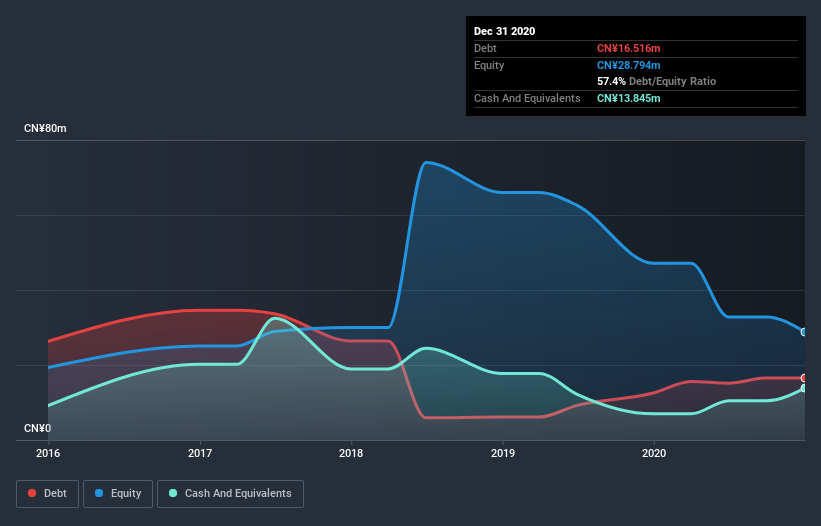Sling Group Holdings (HKG:8285) Is Making Moderate Use Of Debt
David Iben put it well when he said, 'Volatility is not a risk we care about. What we care about is avoiding the permanent loss of capital.' When we think about how risky a company is, we always like to look at its use of debt, since debt overload can lead to ruin. We note that Sling Group Holdings Limited (HKG:8285) does have debt on its balance sheet. But should shareholders be worried about its use of debt?
Why Does Debt Bring Risk?
Debt and other liabilities become risky for a business when it cannot easily fulfill those obligations, either with free cash flow or by raising capital at an attractive price. Part and parcel of capitalism is the process of 'creative destruction' where failed businesses are mercilessly liquidated by their bankers. However, a more usual (but still expensive) situation is where a company must dilute shareholders at a cheap share price simply to get debt under control. By replacing dilution, though, debt can be an extremely good tool for businesses that need capital to invest in growth at high rates of return. When we examine debt levels, we first consider both cash and debt levels, together.
Check out our latest analysis for Sling Group Holdings
How Much Debt Does Sling Group Holdings Carry?
You can click the graphic below for the historical numbers, but it shows that as of December 2020 Sling Group Holdings had CN¥16.4m of debt, an increase on CN¥12.5m, over one year. However, it does have CN¥13.8m in cash offsetting this, leading to net debt of about CN¥2.51m.

How Strong Is Sling Group Holdings' Balance Sheet?
According to the last reported balance sheet, Sling Group Holdings had liabilities of CN¥35.0m due within 12 months, and liabilities of CN¥504.0k due beyond 12 months. Offsetting this, it had CN¥13.8m in cash and CN¥13.8m in receivables that were due within 12 months. So its liabilities total CN¥7.89m more than the combination of its cash and short-term receivables.
This deficit isn't so bad because Sling Group Holdings is worth CN¥37.6m, and thus could probably raise enough capital to shore up its balance sheet, if the need arose. However, it is still worthwhile taking a close look at its ability to pay off debt. When analysing debt levels, the balance sheet is the obvious place to start. But it is Sling Group Holdings's earnings that will influence how the balance sheet holds up in the future. So when considering debt, it's definitely worth looking at the earnings trend. Click here for an interactive snapshot.
Over 12 months, Sling Group Holdings made a loss at the EBIT level, and saw its revenue drop to CN¥89m, which is a fall of 39%. To be frank that doesn't bode well.
Caveat Emptor
While Sling Group Holdings's falling revenue is about as heartwarming as a wet blanket, arguably its earnings before interest and tax (EBIT) loss is even less appealing. Indeed, it lost a very considerable CN¥22m at the EBIT level. When we look at that and recall the liabilities on its balance sheet, relative to cash, it seems unwise to us for the company to have any debt. Quite frankly we think the balance sheet is far from match-fit, although it could be improved with time. Another cause for caution is that is bled CN¥11m in negative free cash flow over the last twelve months. So suffice it to say we consider the stock very risky. When analysing debt levels, the balance sheet is the obvious place to start. However, not all investment risk resides within the balance sheet - far from it. Case in point: We've spotted 3 warning signs for Sling Group Holdings you should be aware of, and 2 of them make us uncomfortable.
If, after all that, you're more interested in a fast growing company with a rock-solid balance sheet, then check out our list of net cash growth stocks without delay.
If you’re looking to trade Sling Group Holdings, open an account with the lowest-cost* platform trusted by professionals, Interactive Brokers. Their clients from over 200 countries and territories trade stocks, options, futures, forex, bonds and funds worldwide from a single integrated account. Promoted
New: Manage All Your Stock Portfolios in One Place
We've created the ultimate portfolio companion for stock investors, and it's free.
• Connect an unlimited number of Portfolios and see your total in one currency
• Be alerted to new Warning Signs or Risks via email or mobile
• Track the Fair Value of your stocks
This article by Simply Wall St is general in nature. It does not constitute a recommendation to buy or sell any stock, and does not take account of your objectives, or your financial situation. We aim to bring you long-term focused analysis driven by fundamental data. Note that our analysis may not factor in the latest price-sensitive company announcements or qualitative material. Simply Wall St has no position in any stocks mentioned.
*Interactive Brokers Rated Lowest Cost Broker by StockBrokers.com Annual Online Review 2020
Have feedback on this article? Concerned about the content? Get in touch with us directly. Alternatively, email editorial-team (at) simplywallst.com.
About SEHK:8285
Sling Group Holdings
An investment holding company, designs and sells women’s handbags, small leather goods, luggage, and travel goods in the People’s Republic of China.
Low risk and slightly overvalued.
Market Insights
Community Narratives



